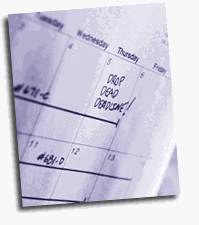
Urgent vs. Important
| Продажи | ||||
| Sales.com | ||||
| Managing | ||||
by Graham Denton
In The Seven Habits of Highly Successful People, Stephen R. Covey claims that the most effective time managers focus less on getting things done than on "preserving and enhancing relationships and accomplishing results." In doing this, they distinguish between the urgent and the important, and they designate the optimum time to both these categories.
 Urgent
matters, Covey writes, are visible, immediate, and often gratifying to
tackle. Important matters, because they may seem less pressing than the
urgent ones, are often postponed. But to achieve success you must attend
to both types of matters. Not to do so may imperil your long-term goals.
Providing a little more specificity, Covey categorizes activities into
four "quadrants."
Urgent
matters, Covey writes, are visible, immediate, and often gratifying to
tackle. Important matters, because they may seem less pressing than the
urgent ones, are often postponed. But to achieve success you must attend
to both types of matters. Not to do so may imperil your long-term goals.
Providing a little more specificity, Covey categorizes activities into
four "quadrants."
In Quadrant I are activities that are both urgent and important: deadlines, crises, and other "do it now" tasks. Nobody can afford to stint on these activities; they are a matter of daily survival, so they get attended to every day. They don't necessary get fixed every day, though, and for that reason Quadrant I activities put an enormous drain on your energy and your composure. If you're constantly putting out fires, you're constantly in stress.
Quadrant II activities are important but not urgent. Because they're not urgent, all but the most effective time managers routinely neglect them. More about these critical forgotten tasks in a moment.
In Quadrant III are activities that are urgent but unimportant. This sounds paradoxical, but in fact most business people give Quadrant III activities a very high priority, second only to the crises in Quadrant I. Phone calls, meetings, email, chores, and the myriad interruptions that characterize most people's working days--all of these things are what Covey calls Quadrant III tasks. Their urgency is generally established by other people, so that dealing with them is an endlessly reactive process. Most people spend too much time spinning wheels in that process.
This is even more the case when you're stuck in Quadrant IV, dealing with issues that are neither urgent nor important. All the rote work and pleasure time and procrastination that people resort to as a way of escaping stress are examples of Quadrant IV "activities." The irony is that the more time you spend here, the less time you will have for truly important matters -- and the more your job stress level actually will increase. People who spend most of their time in Quadrants III and IV, Covey says with brutal honesty, "basically lead irresponsible lives. Effective people stay out of Quadrants III and IV because, urgent or not, they aren't important."
What is important? Quadrant I work, to be sure. But also the work that belongs in Quadrant II, the activities whose importance is disguised because they're not urgent. What Covey is referring to here are the "soft," people-centered activities that enhance relationships and results. Things like "building relationships, writing a personal mission statement, long-range planning, exercising, preventive maintenance, preparations -- all those things we know we need to do, but somehow seldom get around to doing." These activities, he says, are "the heart of effective personal management."
So if you're short of time (and who isn't?), Covey's advice is as original as it is counterintuitive. Put out the fires, yes. But then devote some time, every day, to the "high leverage capacity-building activities" of Quadrant II. The gains in productivity and efficiency may surprise you. Typically, Covey says, people who attend to these "non-urgent" tasks every day soon realize "quantum leaps" in their effectiveness. They create more balance, discipline, and control in their lives, and as a result spend less time managing crises.